
Despite fatigue, slushy roads and voice loss, supporters of the coup in Egypt against President Hosni Mubarak gathered at Harvard Square to march on Saturday.
About 600 people joined the march to support the protests in response to decades of oppression and corruption as well as an increasingly high level of unemployment, hunger and food price inflation.
The march started in Harvard Square and eventually ended at Faneuil Hall at about 4 p.m. The rally gained numerous supporters along the way, including an additional group of Egyptian protestors.
The protestors were primarily Egyptian, though many ethnicities were represented. Boston residents and students alike marched chanting “Freedom!” and “Down! Down! Hosni Mubarak!”
Marihan Hashesh organized the march via a Facebook event called, “Protest for Egypt in Boston” and was surprised at the overwhelming show of support that came out on Saturday. Hashesh’s father, along with 48 cousins, lives in Egypt.
“I just went online, put an event on Facebook and invited about 400 people thinking maybe 100 people would show up,” said Hashesh. “And then I was just surprised that people just kept putting attend and inviting their friends and now we have about 600 people attending today.”
The rise of the coup in Egypt was organized through social media outlets such as Facebook, YouTube and Twitter, leading to government censorship of social media sites and eventually a complete blocking of Internet access in Egypt on Jan. 28.
Many students from the Boston area participated in the rally.
“I was actually in Egypt about a year ago and nothing, nothing to this magnitude happened and so it’s just kind of weird to hear about in a country you just stepped in a year ago,” said Kenneth Burris, a Tufts University senior.
“For the most part, a lot of people are very mad, they’re very tired. They want a different form of government. They want a choice and everyone deserves a choice.”
A group that has played a large role in the organizing of the uprisings in both Tunisia and Egypt is the online group, “Anonymous.”
According to their “Declaration of Freedom,” on the group’s website, Anonymous is “…a leaderless movement that has worked tirelessly to oppose all forms of Internet censorship worldwide, from [Digital Millennium Copyright Act] abuses to government mandated content filters.”
“The uprising started in early December, the first organization of Facebook groups, and websites and events actually started in Egypt and Tunisia on Dec. 2 online with Anonymous,” said Gregg Housh, an Anonymous spokesman. “We had a bunch of Tunisians helping.”
Anonymous members have gotten Internet access into major Egyptian cities as well as Ham radio stations to help support the movement, Housh said.
However, he does not see a definite end to the protests.
“We think the people are going to stay in the streets and are going to keep going until [Mubarak] is gone,” Housh said. “That’s what we’re hoping for. He needs to go.”
The Egyptians are very patient, but enough is enough, Hashesh said.
“Thirty years is more than enough and it’s just anger, anger is coming out and it’s mayhem in the streets,” she said. “People are happy they’re able to express themselves and have the whole world watch. That in itself is huge.”






















































































































